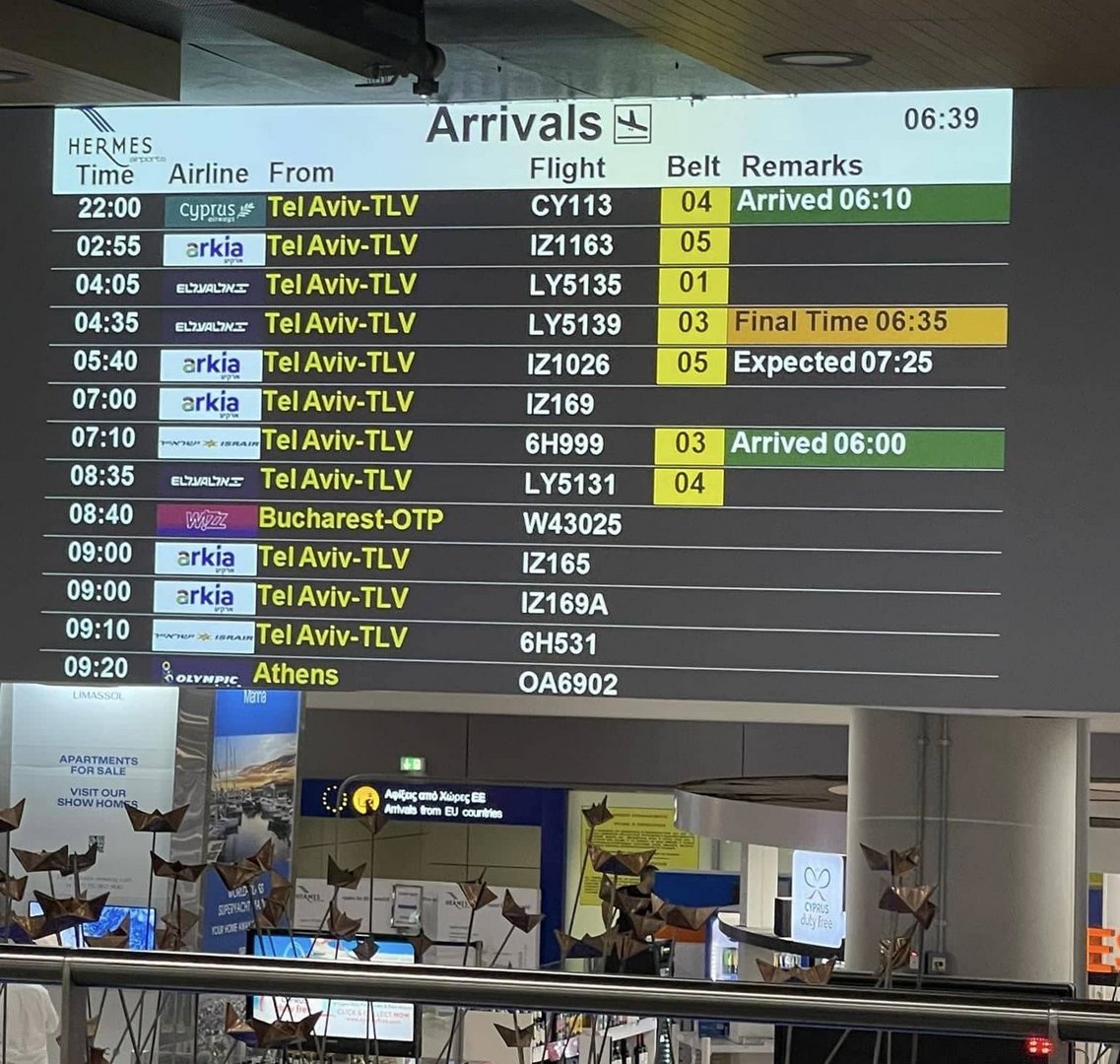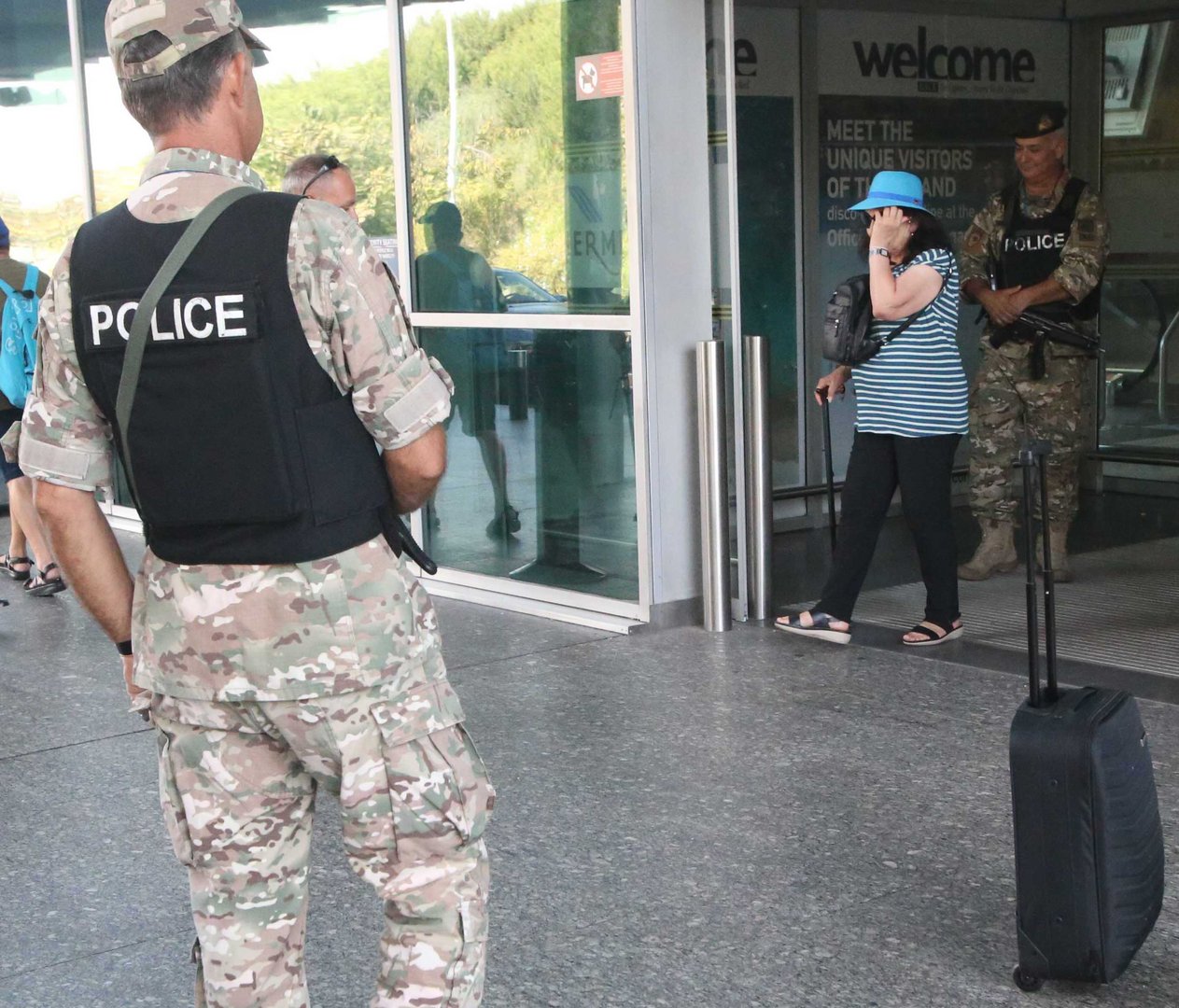The government on Tuesday activated the national ‘Estia’ action plan for the reception of people fleeing the ongoing conflict in Israel.
The plan entails Cyprus acting as a hub for third country nationals fleeing the country before being repatriated to their own countries of origin.
The decision was made following a meeting of the ministerial crisis management group, which was convened by Foreign Minister Constantinos Kombos, and also attended by Interior Minister Constantinos Ioannou and Public Order Minister Anna Procopiou.
Within the scope of the plan, 75 Portuguese nationals, nine Spanish nationals, and one Cypriot arrived in Larnaca aboard a Portuguese air force plane on Tuesday morning.
The same plane will leave Larnaca for Tel Aviv on Wednesday, and is expected to return with other European Union citizens aboard later the same day.
Meanwhile, Israeli nationals arriving at Larnaca airport fleeing the violence told reporters of harrowing scenes.
One passenger told the Phileleftheros newspaper “terrorists are killing people indiscriminately, even on the coasts. There are more than 150 people who have been kidnapped. Most of them were women and children, they entered their homes and kidnapped them when they were sleeping.
“We hope that the Palestinians will be freed from Hamas and I really feel indescribable sadness for the people living and suffering in Gaza,” he said.
One American and Israeli dual citizen added they will now return to the US. “We have no other choice,” she said.
At the same time, many Israelis wishing to return to the country also gathered at the airport.
One man who was on holiday in Ayia Napa told Phileleftheros, “I want to return because my children are waiting for me. I have two young children. Rockets fell in our city and they are terrified.”
The decision to put the Estia plan into place comes after Ioannou had earlier said Cyprus was ready to activate the plan.
If and when evacuations are required, as has happened in the past, “specific plans will be activated, such as the Estia plan, and accordingly the competent bodies of the government will be mobilised,” he said.
To this end, Cypriot airlines TUS Airways and Cyprus Airways are continuing and increasing the number of their flights between Cyprus and Israel.
TUS said on Monday it is organising “a significant number of additional flights” between Tel Aviv and Larnaca.

The arrivals board at Larnaca airport on Tuesday morning
A total of seven additional flights on the route were set to take off on Tuesday, with eight extra flights in total set to take off on Wednesday, Thursday and Friday.
Meanwhile, Cyprus Airways are continuing their flight programme to and from Tel Aviv as scheduled, though they said they are examining increasing capacity.
Additionally, they have waived ticket reissuance fees for passengers who hold valid tickets until November 15 and wish to travel earlier or later.
A spokesperson for Cyprus Airways confirmed to the Cyprus Mail that flights in both directions were currently full, confirming reports that “several thousand” Israeli nationals have been using Cyprus as a transit point to return to the country since the conflict began on Saturday.
Cypriot airlines have bucked the global trend regarding flights to and from Israel, with flight tracking website Flightradar24 saying more than half of scheduled Tel Aviv flights did not operate on Sunday.
American carriers United Airlines, Delta Airlines, and American Airlines all suspended flights to Israel, while European carriers including Ryanair, Norwegian Air Shuttle, Air France, Finnair and Wizz Air all suspended their services.
EgyptAir suspended flights between Cairo and Tel Aviv “indefinitely”, while other airlines including EasyJet and Virgin Atlantic adjusted their services.
On the seas, similar issues have persisted, with the MSC Musica cruise ship among those which have elected to dock and remain in Cyprus rather than continue their previously planned onward journeys to Israel.
Israeli passengers aboard the MSC Musica, which was originally destined for Haifa, will now be transferred to the Crown Iris cruise ship and transported back to the country.
At the same time, hotels in Larnaca are filling up with Israelis fleeing the country.
Menachem Raskin, spokesman for the Jewish community in Cyprus, explained to the Cyprus Mail that “most hotels in Larnaca are packed and fully booked.
“We are working together with them to find a solution,” he said.
This was corroborated by a number of hotels in the town, which all told the Cyprus Mail they currently had no spare rooms.
One hotel said it was experiencing cancellations in the medium term as Israeli nationals with holidays in Cyprus booked in the autumn “do not know whether they will be able to come”, but they said people currently staying at the hotel were extending their stays where possible and more were arriving.
“I wish we had more rooms and more beds, we are completely full and we have been inundated with calls asking for rooms,” another said.
Cyprus has long experience in being an evacuation hub. Thousands of third country nationals were evacuated through Cyprus during the war between Israel and Lebanon’s Hezbollah in 2006. The island was also used as a transit point for the evacuation of mainly British nationals from Sudan earlier this year.







Click here to change your cookie preferences